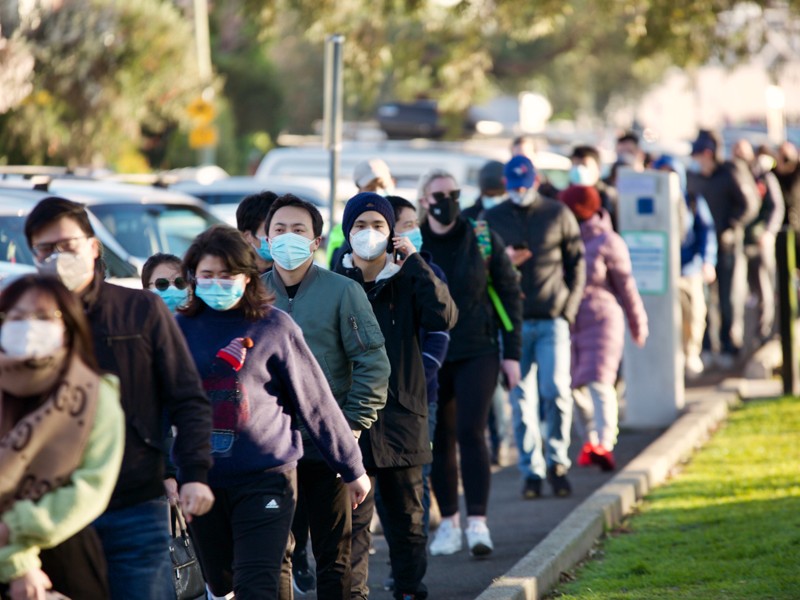Modelling shows that broadly protective sarbecovirus vaccines could halve the number of deaths in a future pandemic.Stockpiled vaccines would dramatically reduce the need for non-pharmaceutical interventions like lockdowns.If they had been available during the COVID-19 pandemic, as many as 65 percent of deaths could have been averted in the first year.
2 October 2025, OSLO. A new study published in Nature Communications reveals that vaccines designed to protect against a wide range of coronaviruses could dramatically reduce deaths and economic disruption and limit the need for lockdowns in the event of another global coronavirus pandemic.
The research, led by Imperial College London and supported by CEPI, modelled the potential impact of broadly protective sarbecovirus vaccines — innovative vaccines that could defend against multiple viruses including a novel sarbecovirus, referred to as SARS-X. Sarbecoviruses are types of coronaviruses that include both SARS-CoV-1, which caused the 2002–2004 SARS outbreak, and SARS-CoV-2, which continues to cause COVID-19.
Broadly protective sarbecovirus vaccines could be manufactured and stockpiled ahead of time and deployed as soon as a new coronavirus is detected, protecting the most vulnerable in the critical early months of a future outbreak while a new vaccine targeting the specific pathogen is being developed.
The modelling shows that, during a SARS-X outbreak, vaccinating high-risk populations aged 60 years and older with a broadly protective sarbecovirus vaccine could reduce mortality by more than half, while also cutting the need for disruptive non-pharmaceutical interventions, such as lockdowns, by more than 60 percent.
“COVID-19 showed us the catastrophic costs of facing a deadly new virus without a vaccine,” said Dr Richard Hatchett, CEO of CEPI. “Broadly protective coronavirus vaccines could change the game. They would buy us valuable time in a future pandemic—saving lives, easing the burden on health systems, and helping societies to stay open—while scientists develop vaccines specifically targeting the new pathogen.”
Vaccines to stay one step ahead of coronaviruses
The study explored multiple scenarios, from SARS-CoV-1-like outbreaks with limited transmission to highly transmissible SARS-CoV-2-like pandemics, and considered a range of assumptions about the size of the vaccine stockpile and the stringency of non-pharmaceutical interventions.
It found that in outbreaks caused by slower-spreading viruses, using broadly protective sarbecovirus vaccines in ring vaccination strategies—where contacts of infected individuals are rapidly immunised—could help to contain transmission and bring an outbreak to an end. For fast-spreading viruses, like SARS-CoV-2, all-in-one shots would not contain outbreaks but could slow the spread of the disease and provide critical protection for those most at risk until a vaccine tailored to the new virus is developed.
In a scenario where it takes 250 days to create such a virus-specific vaccine, broadly protective vaccines could cut deaths in an average upper-middle-income country by more than half.
Even in a scenario in which CEPI’s 100 Days Mission is achieved—a goal to develop new vaccines within 100 days of a pandemic pathogen being identified—and a virus-specific vaccine is available in just three months, all-in-one vaccines would provide a crucial safeguard against more transmissible pathogens. Faced with a pathogen with a reproduction rate of R0=3.5 – similar to that of smallpox, for example – broadly protective sarbecovirus vaccines could reduce deaths by 43 percent and the number of days under non-pharmaceutical interventions by almost 70 percent.
Dr Charlie Whittaker, Assistant Professor, Infectious Diseases & Vaccinology, University of California, Berkeley, who led the modelling study, said: “Our work highlights that a stockpiled broadly protective coronavirus vaccine could halve deaths in a future pandemic. Achieving this impact depends on more than just the vaccines alone though – it will require investment in manufacturing and delivery systems to ensure equitable global access, so that everyone, everywhere can benefit when the next pandemic arrives.”
The researchers also looked back at the COVID-19 pandemic to assess the potential impact of broadly protective sarbecoviruses had they been available. They estimate that as many as 65 percent of deaths could have been averted during the pandemic’s first year, depending on the size of the stockpile. For example, a moderate stockpile with enough doses to vaccinate 60 percent of older adults, could have saved 64,000 lives in Italy (52 percent of those who died), 56,000 lives in Iran (45 percent) and 89,000 lives in Bangladesh (69 percent) during that period.
CEPI’s leadership in broadly protective vaccines
CEPI is a world leader in advancing broadly protective sarbecovirus vaccines, committing over US$200 million to date in a portfolio of vaccines spanning a diverse range of technologies. From RNA to protein-based candidates, the CEPI-supported vaccines each use different strategies for achieving broad protection.
Dr Hatchett added: “We cannot predict when or where the next coronavirus outbreak will emerge, but we can prepare. By investing in all-in-one vaccines now, CEPI is boosting the world’s defences against future coronavirus pandemics.”
The modelling study was conducted by a consortium of researchers from Imperial College London, the University of California, University of New South Wales, Duke-NUS Medical School, the London School of Hygiene & Tropical Medicine, National University of Singapore, National Centre for Infectious Diseases Singapore, Nanyang Technological University Singapore, and CEPI.
The full study is available open access in Nature Communications: Quantifying the impact of a broadly protective sarbecovirus vaccine in a future SARS-X pandemic | Nature Communications
-ENDS- About CEPI
CEPI is an innovative partnership between public, private, philanthropic and civil organisations. Its mission is to accelerate the development of vaccines and other biologic countermeasures against epidemic and pandemic threats so they can be accessible to all people in need. CEPI has supported the development of more than 70 vaccine candidates or platform technologies against multiple known high-risk pathogens or a future Disease X. Central to CEPI’s pandemic-beating plan is the ‘100 Days Mission’ to accelerate the time taken to develop safe, effective, globally accessible vaccines against new threats to just 100 days.
Media Contact Details
CEPI
Email: [email protected]
Phone: +44 7387 055214

